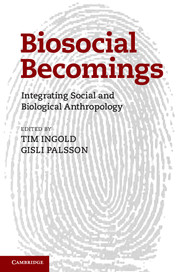Book contents
- Frontmatter
- Contents
- Preface
- 1 Prospect
- 2 Ensembles of biosocial relations
- 3 Blurring the biological and social in human becomings
- 4 Life-in-the-making: epigenesis, biocultural environments and human becomings
- 5 Thalassaemic lives as stories of becoming: mediated biologies and genetic (un)certainties
- 6 Shedding our selves: perspectivism, the bounded subject and the nature–culture divide
- 7 Reflections on a collective brain at work: one week in the working life of an NGO team in urban Morocco
- 8 The habits of water: marginality and the sacralization of non-humans in North-Eastern Ghana
- 9 ‘Bringing wood to life’: lines, flows and materials in a Swazi sawmill
- 10 Humanity and life as the perpetual maintenance of specific efforts: a reappraisal of animism
- 11 Ravelling/unravelling: being-in-the-world and falling-out-of-the-world
- 12 Retrospect
- References
- Notes on the contributors
- Index
10 - Humanity and life as the perpetual maintenance of specific efforts: a reappraisal of animism
Published online by Cambridge University Press: 05 June 2014
- Frontmatter
- Contents
- Preface
- 1 Prospect
- 2 Ensembles of biosocial relations
- 3 Blurring the biological and social in human becomings
- 4 Life-in-the-making: epigenesis, biocultural environments and human becomings
- 5 Thalassaemic lives as stories of becoming: mediated biologies and genetic (un)certainties
- 6 Shedding our selves: perspectivism, the bounded subject and the nature–culture divide
- 7 Reflections on a collective brain at work: one week in the working life of an NGO team in urban Morocco
- 8 The habits of water: marginality and the sacralization of non-humans in North-Eastern Ghana
- 9 ‘Bringing wood to life’: lines, flows and materials in a Swazi sawmill
- 10 Humanity and life as the perpetual maintenance of specific efforts: a reappraisal of animism
- 11 Ravelling/unravelling: being-in-the-world and falling-out-of-the-world
- 12 Retrospect
- References
- Notes on the contributors
- Index
Summary
The oddity of modern conceptions of humanity and life
One way of describing contemporary western cosmology would be to say that it is characterized by notions of humanity and life that are curiously unconditional. Western societies are often supposed to be exceedingly bureaucratic, yet they display an astonishing lack of bureaucracy in this particular respect. The requirements that have to be fulfilled to be counted as ‘human’ or ‘alive’ are absolutely minimal. No forms have to be filled out, there is no waiting list or exam to be passed, no proof of competence is needed, no trial period has to be completed. Provided you are born of a human mother, no specific effort has to be made whatsoever: the moment you come into the world, you are human (as well as alive) by default – no further questions asked. As long as you keep breathing, nobody will challenge your status as a ‘human being’. In this context, humanity is entirely maintenance-free. The same applies, more generally, to life. As long as you are animate, your status as a ‘living being’ is assured. Within modern, western cosmology both humanity and life are given, in the sense that they are not something you have actively to work towards and deliberately need to uphold at all times. In such a framework, to ask whether something is human or alive is a matter of either/or rather than degree (even though this axiom is beginning to be questioned in such fields as cell biology; Landecker 2003). In this chapter I demonstrate that this widespread attitude of unrecognized complacency is actually quite strange. This becomes apparent if one considers notions of humanity and life more broadly, especially from the perspective of so-called animistic people. In what follows I illustrate through ethnography that if there is one thing that unifies the most diverse forms of animism across the world, it is a consistent emphasis on achievement rather than birthright. My suggestion is that animistic notions of humanity and life share a highly original yet poorly understood feature: they depend on continual, never-ending efforts. Such efforts are neither rigidly constricted nor entirely random; even though they are to a certain degree negotiable and may evolve over time, they are fairly narrowly circumscribed and relatively stable. In such a framework, I aim to show, humanity and life are always conditional. Within animism, both humanity and life entail specific efforts and require perpetual maintenance.
- Type
- Chapter
- Information
- Biosocial BecomingsIntegrating Social and Biological Anthropology, pp. 191 - 210Publisher: Cambridge University PressPrint publication year: 2013
- 9
- Cited by



